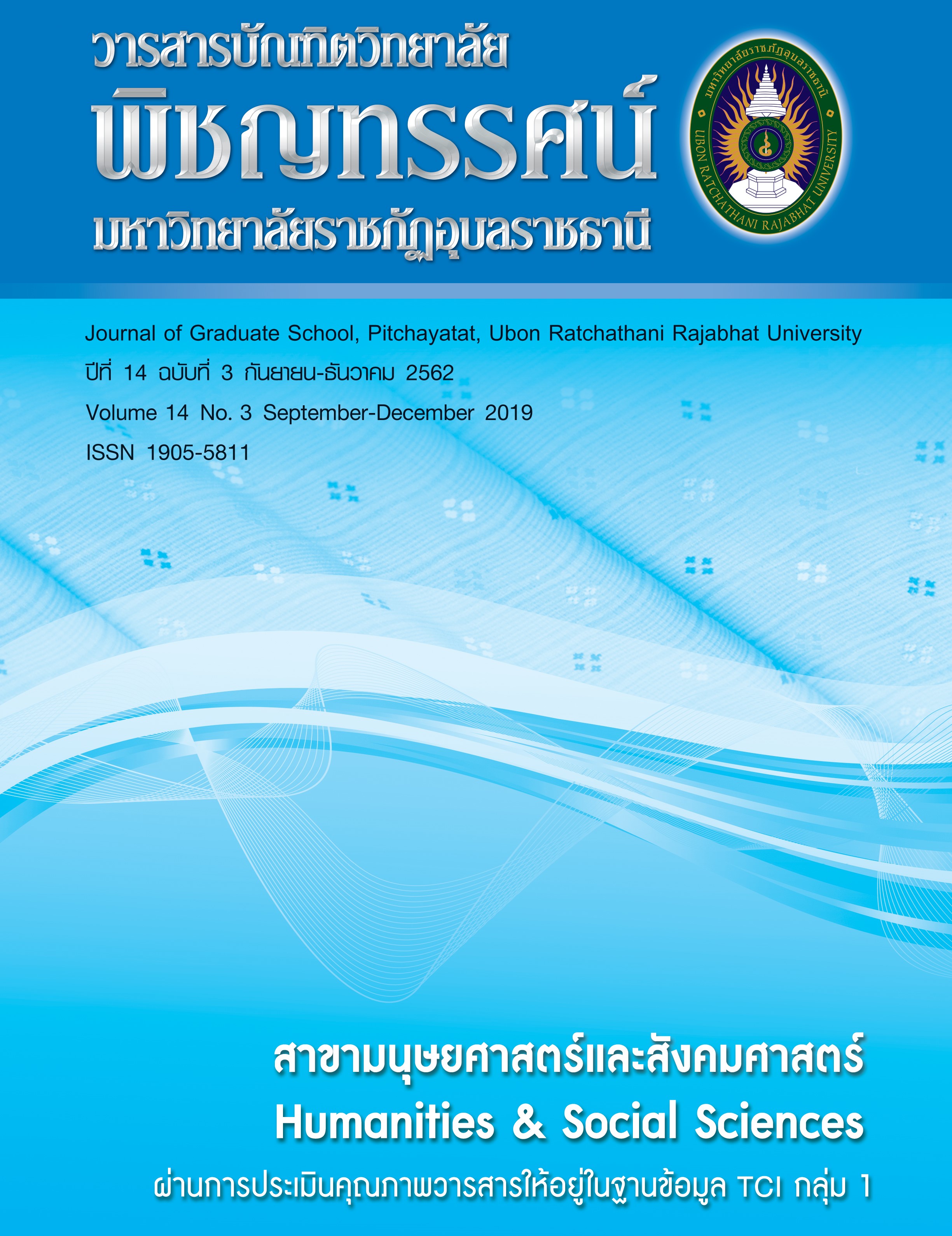รูปแบบการจัดการเรียนรู้เชิงประสบการณ์เพื่อเสริมสร้างความศรัทธาในวิชาชีพครูของนักศึกษาหลักสูตรประกาศนียบัตรบัณฑิตวิชาชีพครู
บทคัดย่อ
การวิจัยครั้งนี้มีวัตถุประสงค์เพื่อ 1) พัฒนารูปแบบการจัดการเรียนรู้เชิงประสบการณ์เพื่อเสริมสร้างความศรัทธาในวิชาชีพครูของนักศึกษาหลักสูตรประกาศนียบัตรบัณฑิตวิชาชีพครู และ 2) ประเมินประสิทธิผลรูปแบบ การดำเนินการวิจัยใช้ระเบียบวิธีวิจัยและพัฒนา 2 ระยะ คือ ระยะที่ 1 พัฒนารูปแบบการจัดการเรียนรู้เชิงประสบการณ์เพื่อเสริมสร้างความศรัทธาในวิชาชีพครูของนักศึกษาหลักสูตรประกาศนียบัตรบัณฑิตวิชาชีพครูโดยการศึกษา วิเคราะห์ และสังเคราะห์ เอกสาร แนวคิด ทฤษฎี งานวิจัยที่เกี่ยวข้องเพื่อกำหนดองค์ประกอบและสาระของรูปแบบ และเครื่องมือที่ใช้ในการวิจัย หลังจากนั้นตรวจสอบคุณภาพรูปแบบและเครื่องมือโดยผู้ทรงคุณวุฒิ 5 คน เพื่อตรวจสอบความตรงเชิงเนื้อหา โดยการหาค่าดัชนีความสอดคล้อง ก่อนทดลองใช้กับนักศึกษาหลักสูตรประกาศนียบัตรบัณฑิตวิชาชีพครูจำนวน 28 คน และระยะที่ 2 ผู้วิจัยนำรูปแบบที่พัฒนาขึ้นไปใช้เพื่อประเมินประสิทธิผลกับกลุ่มเป้าหมายที่เป็นนักศึกษาหลักสูตรประกาศนียบัตรบัณฑิตวิชาชีพครู บัณฑิตวิทยาลัย มหาวิทยาลัยราชภัฏนครศรีธรรมราช ซึ่งได้มาโดยวิธีเลือกแบบเจาะจง จำนวน 30 คน เครื่องมือที่ใช้ในการวิจัยประกอบด้วย 1) รูปแบบ 2) คู่มือการใช้รูปแบบสำหรับผู้เรียนและผู้สอน 3) แบบวัดความศรัทธาในวิชาชีพครู 3 ด้าน ได้แก่ แบบทดสอบด้านความรู้ แบบประเมินพฤติกรรม และแบบวัดเจตคติ และ 4) แบบประเมินความพึงพอใจในการจัดการเรียนรู้ด้วยรูปแบบที่พัฒนาขึ้น แบบแผนการวิจัยเป็นการวิจัยแบบกลุ่มเดียวทดสอบก่อนและหลังการใช้รูปแบบ One Group Pretest-Posttest Design สถิตที่ใช้ในการวิเคราะห์ข้อมูล คือ ค่าเฉลี่ย ส่วนเบี่ยงเบนมาตรฐาน การทดสอบที ข้อมูลเชิงคุณภาพใช้การวิเคราะห์เนื้อหา
ผลการวิจัย
- ผลการพัฒนารูปแบบการจัดการเรียนรู้เชิงประสบการณ์เพื่อเสริมสร้างความศรัทธาในวิชาชีพครูของนักศึกษาหลักสูตรประกาศนียบัตรบัณฑิตวิชาชีพครู พบว่า รูปแบบประกอบด้วย 6 องค์ประกอบ ได้แก่ 1) หลักการ 2) วัตถุประสงค์ 3) เนื้อหา 4) กิจกรรมการเรียนรู้ 5) สื่อและแหล่งเรียนรู้ และ6) การวัดและประเมินผล ทั้งนี้ องค์ประกอบ ทั้ง 6 เกี่ยวข้องกับ ระบบการจัดการเรียนรู้เชิงประสบการณ์ 4 กระบวนการ เรียกว่า 4Es Model คือ ขั้นที่ 1 แลกเปลี่ยน (exchange) ขั้นที่ 2 เรียนรู้ (educate) ขั้นที่ 3 ลงสู่ประสบการณ์ (experience) และขั้นที่ 4 เบิกบานด้วยศรัทธา (enlighten faith) (โดยมีผลการตรวจสอบได้ค่าดัชนีความสอดคล้อง เท่ากับ 1.00)
- ผลการประเมินประสิทธิผลรูปแบบ พบว่า ผลคะแนนการวัดความศรัทธาในวิชาชีพครูโดยรวมทั้ง 3 ด้าน ได้แก่ ด้านความรู้ ด้านพฤติกรรม และด้านเจตคติ ของกลุ่มเป้าหมาย วิเคราะห์เปรียบเทียบโดยการทดสอบที พบว่า หลังจากได้รับการเสริมสร้างความศรัทธาในวิชาชีพครูโดยใช้รูปแบบ สูงกว่าก่อนเรียนอย่างมีนัยสำคัญทางสถิติ และผลการประเมินความพึงพอใจที่มีต่อรูปแบบการจัดการเรียนรู้เชิงประสบการณ์เพื่อเสริมสร้างความศรัทธาในวิชาชีพครูมีค่าเฉลี่ยหลังเรียนโดยรวมอยู่ในระดับมีความพึงพอใจมากที่สุด
เอกสารอ้างอิง
ประทุม อังกูรโรหิต. ปรัชญาปฏิบัตินิยม รากฐานปรัชญาการศึกษาในสังคมประชาธิปไตย.กรุงเทพฯ: สำนักพิมพ์แห่งจุฬาลงกรณ์มหาวิทยาลัย, 2556.
ปาริชาติ ประเสริฐสังข์. การพัฒนารูปแบบการเรียนการสอนโดยการบริการสังคมสำหรับนักศึกษาวิชาชีพครู. วิทยานิพนธ์ปรัชญาดุษฎี
บัณฑิต มหาวิทยาลัยมหาสารคา, 2556.
พรรณวร บุญประเศรษฐผล. การพัฒนารูปแบบการสอนภาษาอังกฤษโดยใช้การเรียนรู้แบบเน้นประสบการณ์สำหรับนักศึกษาระดับประกาศนียบัตรวิชาชีพชั้นสูง. วิทยานิพนธ์การศึกษาดุษฎีบัณฑิต มหาวิทยาลัยนเรศวร, 2552.
ไพโรจน์ โสภา. ศรัทธา กุญแจสู่ความสำเร็จ ร่ำรวย เปิดประตูสู่นิพพาน. กรุงเทพฯ: สำนักพิมพ์เลี่ยงเชียง เพียรเพื่อพุทธศาสตร์ จำกัด, มปป.
ภาวัต ตั้งเพชรเดโช. จิตวิญญาณความเป็นครูกับความก้าวหน้าในอาชีพที่พยากรณ์ความทุ่มเทในการทำงานของครู. วิทยานิพนธ์ศิลปศาสตรมหาบัณฑิต มหาวิทยาลัยเทคโนโลยีพระจอมเกล้าพระนครเหนือ, 2556.
ราชกิจจานุเบกษา. ข้อบังคับคุรุสภาว่าด้วยจรรยาบรรณของวิชาชีพ พ.ศ. 2556. เล่ม 130 ตอนพิเศษ 130 ง หน้า 72-74 ลงวันที่ 4 ตุลาคม 2556.
ราชกิจจานุเบกษา. ข้อบังคับคุรุสภาว่าด้วยแบบแผนพฤติกรรมตามจรรยาบรรณของวิชาชีพ พ.ศ. 2550. เล่ม 124 ตอนพิเศษ 51 ง หน้า 37-56 ลงวันที่ 27 เมษายน 2550.
ราชกิจจานุเบกษา. ข้อบังคับคุรุสภาว่าด้วยมาตรฐานวิชาชีพและจรรยาบรรณของวิชาชีพ พ.ศ. 2548. เล่ม 122 ตอนพิเศษ 76 ง หน้า 39-46 ลงวันที่ 5 กันยายน 2548.
ราชกิจจานุเบกษา.พระราชบัญญัติการศึกษาแห่งชาติ พ.ศ. 2542 เล่ม 116 ตอนที่ 74 ก หน้า 1-23 ลงวันที่ 19 สิงหาคม 2542.
รุ่งระวี สมะวรรธนะ. การพัฒนารูปแบบการเรียนการสอนสุขศึกษาโดยใช้ภาษาอังกฤษเป็นสื่อตามทฤษฎีการเรียนรู้เน้นประสบการณ์และแนวคิดการ บูรณาการเนื้อหากับภาษา เพื่อเสริมสร้างพฤติกรรมสุขภาพและความสามารถในการสื่อสารเป็นภาษาอังกฤษของนักเรียนมัธยมศึกษาตอนต้น วิทยานิพนธ์ครุศาสตรดุษฎีบัณฑิต จุฬาลงกรณ์มหาวิทยาลัย, 2553.
วิจารณ์ พานิช. การสร้างการเรียนรู้สู่ศตวรรษที่ 21. กรุงเทพฯ: มูลนิธิสยามกัมมาจล, 2556.
สรวงพร กุศลส่ง. การพัฒนารูปแบบการเรียนการสอนที่ส่งเสริมยุทธวิธีการรู้คิดสำหรับนักศึกษามหาวิทยาลัยราชภัฏ. วิทยานิพนธ์การศึกษาดุษฎีบัณฑิต มหาวิทยาลัยนเรศวร, 2558.
สาธารณสุข, กระทรวง. กรมสุขภาพจิต. คู่มือการฝึกอบรมแบบมีส่วนร่วม. พิมพ์ครั้งที่ 4. กรุงเทพฯ: วงศ์กมล โปรดักชั่น จำกัด, 2544.
เลขาธิการสภาการศึกษา, สำนักงาน. ข้อเสนอการปฏิรูปการศึกษาไทยในทศวรรษที่สอง (พ.ศ. 2552-2561). กรุงเทพฯ: บริษัทพริกหวานกราฟฟิคจำกัด, 2552.
เลขาธิการสภาการศึกษา, สำนักงาน. รายงานผลการศึกษาสถานภาพการผลิตและพัฒนาครูในประเทศไทย. กรุงเทพฯ: บริษัทพริกหวานกราฟฟิคจำกัด, 2558.
ดาวน์โหลด
เผยแพร่แล้ว
รูปแบบการอ้างอิง
ฉบับ
ประเภทบทความ
สัญญาอนุญาต
บทความทุกเรื่องได้รับการตรวจความถูกต้องทางวิชาการโดยผู้ทรงคุณวุฒิภายนอกอย่างน้อย 3 คน ความคิดเห็นในวารสารพิชญทรรศน์เป็นความคิดเห็นของผู้นิพนธ์มิใช่ความคิดเห็นของผู้จัดทำ จึงมิใช่ความรับผิดชอบของวารสารพิชญทรรศน์ และบทความในวารสารพิชญทรรศน์สงวนสิทธิ์ตามกฎหมายไทย การจะนำไปเผยแพร่ต้องได้รับอนุญาตเป็นลายลักษณ์อักษรจากกองบรรณาธิการ





